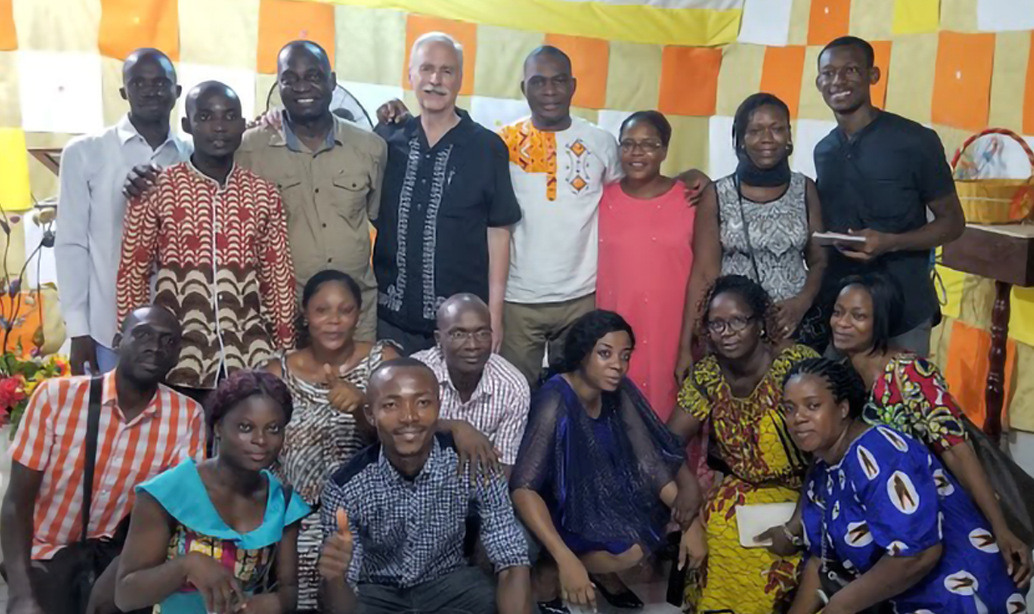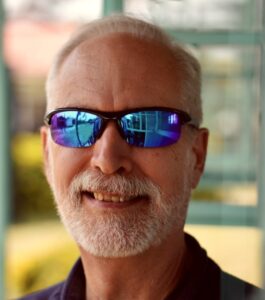
How Nonprofits Can Use Texting Guide
October 23, 2023
3 Fundraising Mistakes Nonprofits Should Avoid
October 25, 2023Virgil Hughes mission for NewVines International

Virgil Hughes mission for NewVines International is empowering people in need to regain dignity, build futures, and restore hope.
I recently spoke for over two hours with Virgil Hughes, the founder of NewVines International (NVI), a Virginia-based non-profit organization established less than a decade ago to transform lives by alleviating poverty in all its forms. I was struck by how little money Hughes had at his disposal when the company was launched. It reminded me of the miracle cited in John 6:1-14: Jesus used five small loaves of bread and two small fish to work through his followers to feed more than 5,000 people! Jesus accepted the gift from a small boy, thanked God for it, and used it to feed the entire crowd with leftovers to spare!
 Indeed, Hughes proudly acknowledged his Christian faith for leading his life in this direction. It’s not something one would have expected from a successful executive who ran a multimillion-dollar healthcare organization! Were it not for cancer that struck him in his prime, the sixty-nine-year-old Hughes might now be comfortably retired, spending days hunting duck and deer as he did as a boy in Tappahannock, Virginia.
Indeed, Hughes proudly acknowledged his Christian faith for leading his life in this direction. It’s not something one would have expected from a successful executive who ran a multimillion-dollar healthcare organization! Were it not for cancer that struck him in his prime, the sixty-nine-year-old Hughes might now be comfortably retired, spending days hunting duck and deer as he did as a boy in Tappahannock, Virginia.
After graduating from the University of Michigan in 1976, Hughes entered the venture capital business and investment banking, but neither was satisfying. What grabbed his interest was a move into the role of corporate “fixer”, stepping into turnaround situations – mostly faith-based healthcare companies which were in deep financial trouble – and returning them to fiscal viability.
His bout with cancer from 2004–2006 drew him closer to Christianity and helped him reassess his real purpose in life. He became a full-time business consultant to have the flexibility to restore his health while earning income. More importantly, he heard the Lord speak to him and call him to bless the poor. “I had no idea how to do that,” Hughes confessed.
He first tried to partner with other individuals in his then-home of Pittsburgh to feed the poor living under the city’s many bridges. It was tough sledding, especially for such a physically weakened man, and it didn’t work out for various reasons. He tried other things that also didn’t work out, leaving him frustrated.
Eventually, he joined members of his church on a mission trip to Africa in 2012. It was his first exposure to abject poverty, and he began to talk with church and village leaders about something closer to his professional wheelhouse: microlending. Hughes met with several village leaders who were intrigued by the idea. When he returned to Africa the following year, he could see that the leaders had formed several local saving/lending groups that were having a positive impact on the members of the groups.
Christmastime of 2013, Hughes received an email from a villager who thanked him for changing his life. The man was exuberant about the financial impact that the training had on his life. Hughes was humbled: “I hadn’t put anything into it, all I did was come across the ocean with an idea. But it was enough that they (the villagers) took action that changed lives.” From then on, I just said, ‘I’m going to do this.’”
In his waning days in Pittsburgh, he chartered NewVines International as a non-profit. He spent several months applying for his tax exemption determination letter from the IRS and learning how to build a website (www.newvinesintl.org), which went live on August 16, 2016.
Money was scarce – most of his corporate network “dried up” during his cancer years – but Hughes’ vision inspired some close friends and churchgoers, and donations began to come in, funding his first mission trip to Western Kenya in October 2016. There, Hughes met a fellow missionary who took him around to meet some key leaders in Kenya, and he immediately found several local church leaders who were eager to work with NVI.
Hughes went back in Africa in 2017 and was off to the races. The game changer was when another friend gifted him training materials that an organization had developed – using grant money to hire a group of Christian men with degrees in Economics to study best practices amongst non-profits worldwide. “It was so transformational that our ministry was effective right out of the box,” Hughes freely admitted.
When working with local churches, microlending indeed took center stage initially, but he quickly realized that training and accountability would ultimately lead to even more success. “You could go to Africa and give out a trillion dollars, and it would be gone in a year,” he emphasized. “Fortunately, if I had raised significant funds right out of the box, I might have started microlending immediately, and it would have been a disaster.” Hughes pointed out that most of these countries are poor for a reason. “Until you change what’s up here (pointing to his brain), only a fraction of people will use money wisely. It’s the training that changes people’s lives. The money allows them to implement the training at a slightly higher level.”
Scholars like Covenant College (GA) professors Steve Corbett & Brian Fikkert, who wrote When Helping Hurts: How To Alleviate Poverty Without Hurting The Poor – And Yourself have dissected common perceptions on poverty and concluded that individual churches should not get into microlending because they screw it up. Hughes laments that most Americans who go to Africa hand out money like it is water. “It’s a blemish on the entire ministry. And it creates seriously bad expectations around money issues.”
Today, NVI is based in Salem, Virginia, and runs on a highly efficient budget. His payroll consists of one Lead Trainer, Fred Ohdiambo, 3 Country Directors, and 3 Regional Trainers, spread across Western Kenya, Uganda, Ivory Coast, and Togo. Some 250 volunteer trainers in the various church denominations have been trained downline of the organizations’ Senior Trainers. Hughes has never asked his Board to give him more than $5,000 as an annual stipend.
In a short time, Hughes has built a nearly perfect business model. “We’re almost there – it’s kind of like a Christmas tree – it’s in the stand, and now we’re just adding tinsel here and there.” But the perfect business model (in Hughes’ humble opinion!) is quickly evolving – partnering with large existing church and faith-based organizations because NVI adds synergistically to their ministries.
His pitch to churches is simple: “If you do what you do well (sending teams to different African locations to build orphanages, work in medical clinics, provide youth services, and other outreach initiatives), NVI will be your partner to help alleviate the poverty and financial chaos all around you.”
In the last two fiscal years, NVI has gone from having 1,200 people who have been fully trained to about 10,000 people. Hughes’ job has morphed from training one church at a time to training leadership groups within large church organizations and helping them see the value in changing the typical African culture of giving money to the poor without any accountability. “They push the training downline for us. They know where the very poor are located and help us find the best candidates to award small business loans. I don’t need to go ferret them out.”
The commitment Hughes requires from a partner organization is straightforward; he asks them to assemble thirty or so men and women as the first tier of trainers and gives them a 5-page questionnaire to complete ahead of the training. He wants to know the value they place on financial management and the role existing African culture may play. It’s both informational for Hughes and a team-building exercise for the trainers.
If there is a fit, Hughes or another trainer will travel to the organization for the initial training at NVI’s expense and provide the initial training materials. He doesn’t get many dropouts in the trainer groups. “Our first training sessions are life-changing,” claims Hughes. So much so that most partners expand to a second tier of trainers and bear all ongoing costs. They see the value in changing the culture and quickly acknowledge, “This guy [Hughes] is different: he’s making us responsible. He really makes us work at it.”
When I asked Hughes what he might do with $1 million if someone helped him raise that kind of money, he explained how easy it would be to expand his relationship with several organizations. For example, he’s now working with Teen Challenge-Kenya – part of Global Teen Challenge (GTC), a network of Christian rehabilitation services to people struggling with addiction – in Nairobi. He could quickly expand to every capital city in Africa where GTC operates. “I could set up an office to coordinate just that one initiative and hire people in each location immediately.”
He currently collaborates with 48 churches out of the 250 total in three regions of the Presbyterian Church of East Africa. Additionally, he has partnered with 12 out of the 300 churches belonging to the Kingdom Role Models Fellowship. He aided the Africa Gospel Church in expanding beyond Kenya into four countries. Anglican leaders in six countries and four major Baptist organizations in three countries have also sought his assistance.
These are some of the huge improvements NVI has made in the lives of people who have received financial management training:
- 90% of all students can start or expand a business.
- Household incomes increase by 40% within a year.
- 80% of students report starting a savings account.
- Annual savings increase to cover an additional 1-3 months of living expenses.
- In one year, the portion of widows able to afford school fees for ALL their children increases from 25% to 100%.
- The portion of widows able to feed their children every day increases from 50% to 100%.
Hughes knows how his work filters out into the different communities NVI serves. “Our reach is much broader than the number of loans we make or the number of students we graduate. Because we’re teaching couples to talk about their money, and we’re seeing marriages heal. We’re seeing our trainers do more than train in their churches – they’re starting to teach kids as young as first graders lessons on managing and saving money. We’re changing culture.”
Virgil Hughes mission for NewVines International was first posted at 501c3.buzz
For more articles like – Virgil Hughes mission for NewVines International VISIT HERE
The post Virgil Hughes mission for NewVines International appeared first on 501c3.buzz.
